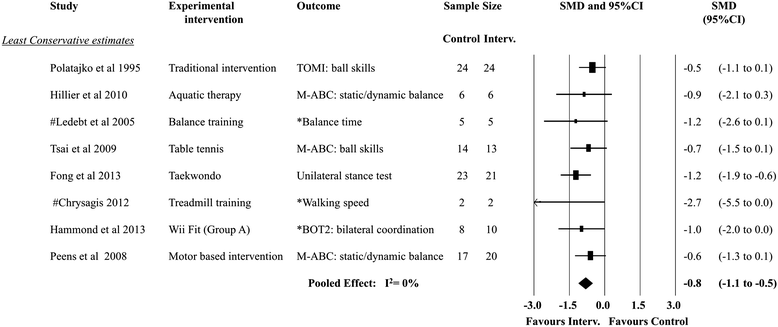Interventions to improve gross motor performance in children with neurodevelopmental disorders: a meta-analysis
- PMID: 27899082
- PMCID: PMC5129231
- DOI: 10.1186/s12887-016-0731-6
Interventions to improve gross motor performance in children with neurodevelopmental disorders: a meta-analysis
Abstract
Background: Gross motor skills are fundamental to childhood development. The effectiveness of current physical therapy options for children with mild to moderate gross motor disorders is unknown. The aim of this study was to systematically review the literature to investigate the effectiveness of conservative interventions to improve gross motor performance in children with a range of neurodevelopmental disorders.
Methods: A systematic review with meta-analysis was conducted. MEDLINE, EMBASE, AMED, CINAHL, PsycINFO, PEDro, Cochrane Collaboration, Google Scholar databases and clinical trial registries were searched. Published randomised controlled trials including children 3 to ≤18 years with (i) Developmental Coordination Disorder (DCD) or Cerebral Palsy (CP) (Gross Motor Function Classification System Level 1) or Developmental Delay or Minimal Acquired Brain Injury or Prematurity (<30 weeks gestational age) or Fetal Alcohol Spectrum Disorders; and (ii) receiving non-pharmacological or non-surgical interventions from a health professional and (iii) gross motor outcomes obtained using a standardised assessment tool. Meta-analysis was performed to determine the pooled effect of intervention on gross motor function. Methodological quality and strength of meta-analysis recommendations were evaluated using PEDro and the GRADE approach respectively.
Results: Of 2513 papers, 9 met inclusion criteria including children with CP (n = 2) or DCD (n = 7) receiving 11 different interventions. Only two of 9 trials showed an effect for treatment. Using the least conservative trial outcomes a large beneficial effect of intervention was shown (SMD:-0.8; 95% CI:-1.1 to -0.5) with "very low quality" GRADE ratings. Using the most conservative trial outcomes there is no treatment effect (SMD:-0.1; 95% CI:-0.3 to 0.2) with "low quality" GRADE ratings. Study limitations included the small number and poor quality of the available trials.
Conclusion: Although we found that some interventions with a task-orientated framework can improve gross motor outcomes in children with DCD or CP, these findings are limited by the very low quality of the available evidence. High quality intervention trials are urgently needed.
Keywords: Cerebral palsy; Child development; Developmental Coordination Disorder; Motor skills; Motor skills disorders; Neurodevelopmental disorders; Physiotherapy.
Figures
References
-
- Guidelines for School and Community Programs to Promote Lifelong Physical Activity Among Young People. Centers for Disease Control and Prevention, Morbidity and Mortality Weekly Report; Recommendations and Reports. March 07, 1997;46(RR-6):1–36. http://www.cdc.gov/mmwr/preview/mmwrhtml/00046823.htm?ref=driverlayer.com. Accessed 20 Aug 2015. - PubMed
-
- Fundamental Movement Skills. ACT Government, Health. Kids at Play. http://health.act.gov.au/healthy-living/kids-play/active-play-everyday/f.... Accessed 8 Aug 2015.
-
- Roberts G, Anderson PJ, Davis N, De Luca C, Cheong J, Doyle LW, et al. Developmental coordination disorder in geographic cohorts of 8-year-old children born extremely preterm or extremely low birthweight in the 1990s. Dev Med Child Neurol. 2011;53(1):55–60. doi: 10.1111/j.1469-8749.2010.03779.x. - DOI - PubMed
Publication types
MeSH terms
Grants and funding
LinkOut - more resources
Full Text Sources
Other Literature Sources
Medical
Miscellaneous





